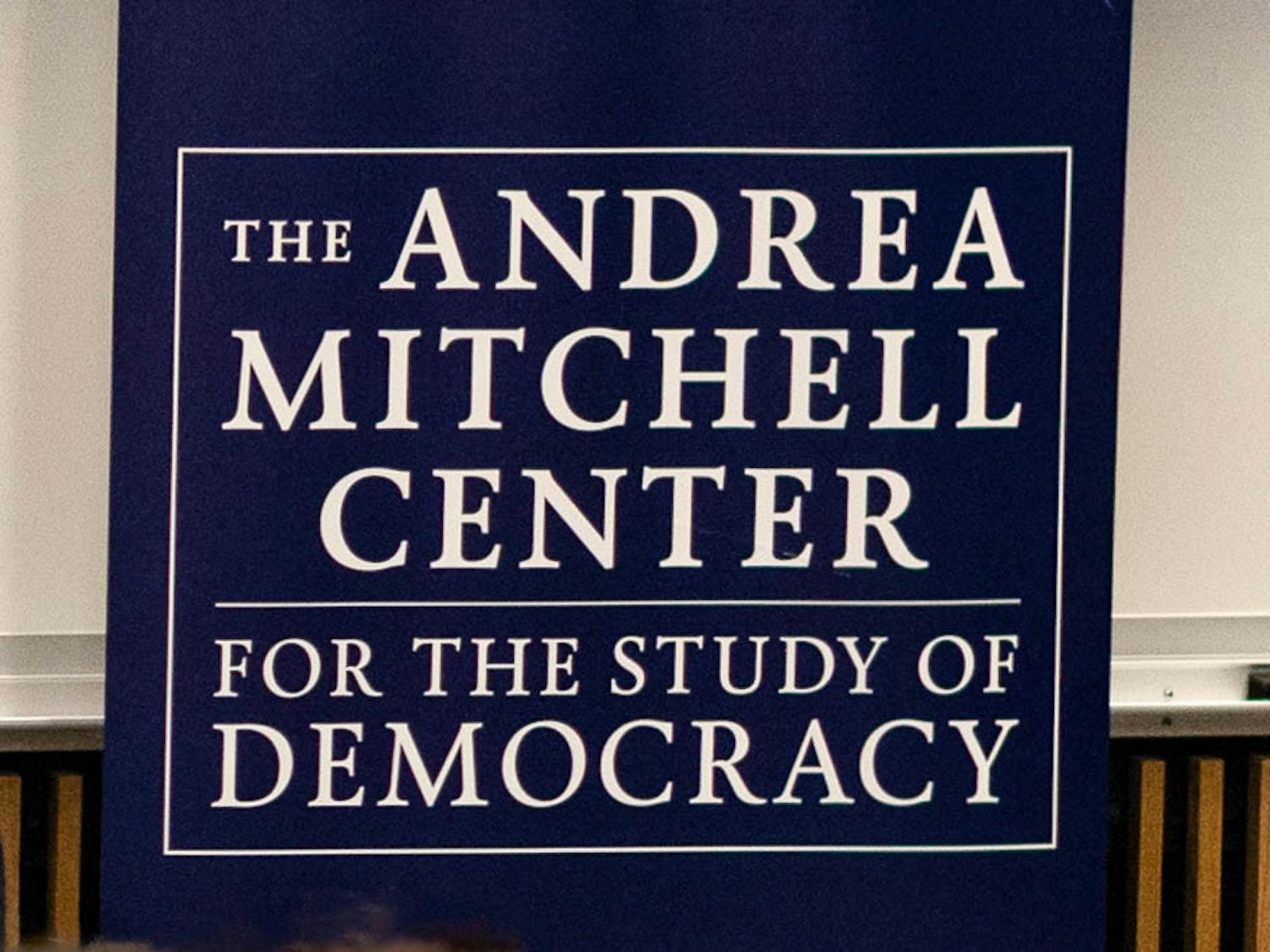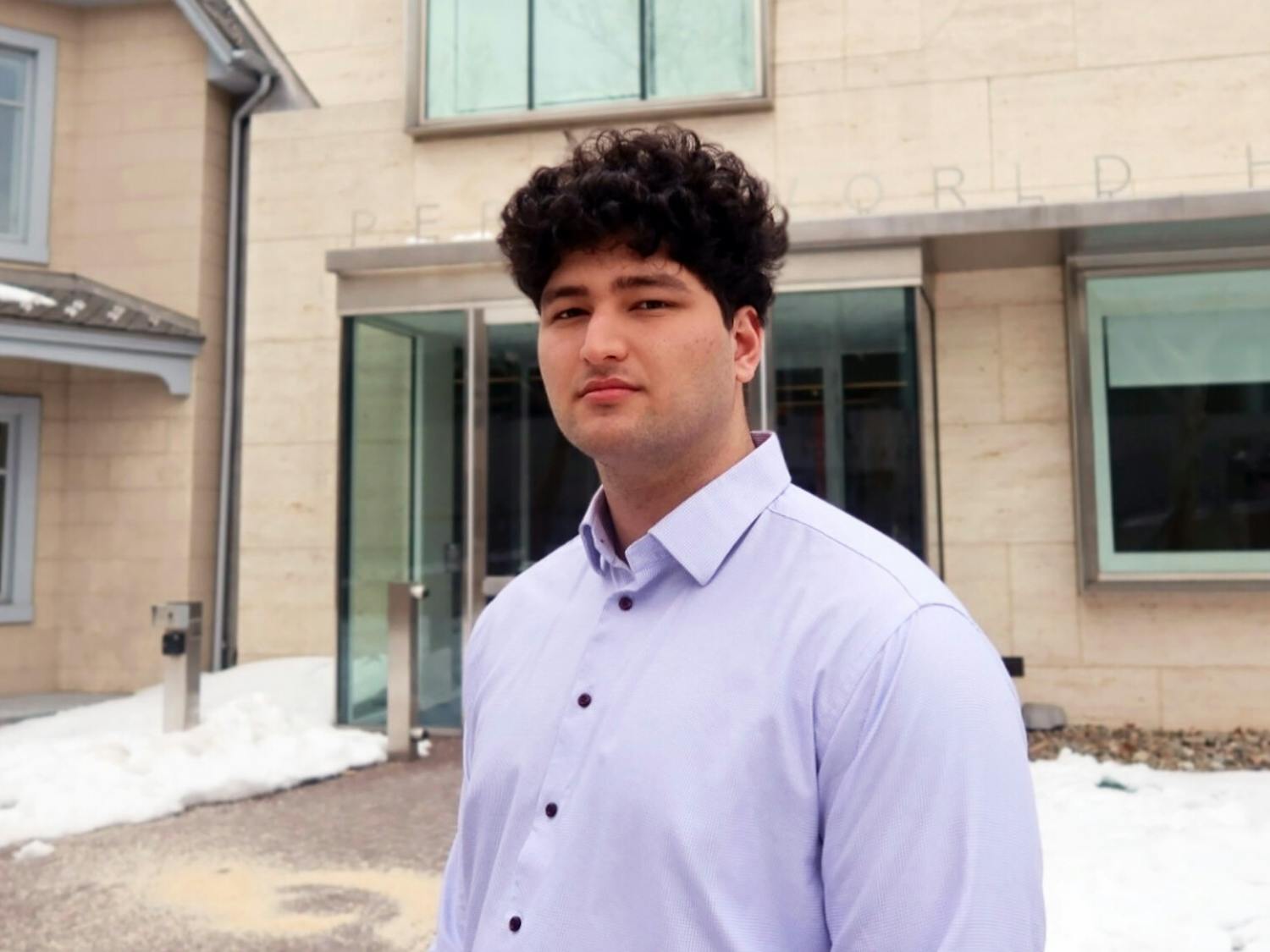Penn Faculty for Justice in Palestine organized a die-in outside College Hall on Monday to demonstrate solidarity with civilians in Gaza amid the Israel-Hamas conflict.
In the die-in, participants simulated being dead to represent the victims of the Israel-Hamas conflict and protest ongoing violence in Gaza. The main entrance of College Hall was closed for the duration of the protest, which lasted approximately one hour. Two Division of Public Safety officers stood behind the entrance throughout the demonstration.

Demonstrators lay down on the steps of College Hall during the die-in.
Bassil Kublaoui, an associate professor of clinical pediatrics at Penn Medicine and a spokesperson for PFJP, said that the purpose of the die-in was to draw attention to “the inaction of the university towards the Palestinian community and the racist, hate speech directed towards faculty, staff, and students calling for Palestinian justice.”
“We’re here because the University has been largely overlooking the Palestinian community and the killings of tens of thousands of civilians,” Kublaoui said.
The event began with protestors laying down on the steps of College Hall and holding signs protesting Palestinian deaths throughout the conflict. Protestors laid down a parchment displaying close to 7,000 names of Palestinian victims killed during the conflict and recited their names and ages.
Around 86 University affiliates either participated in or spectated the protest. A University spokesperson did not respond to a request for comment.
The protest continued with the participants walking from College Hall towards the Stuart Weitzman School of Design, holding signs condemning the deaths of civilians throughout the conflict.
RELATED:
How the controversy over Liz Magill's leadership has unfolded at Penn
Hundreds of faculty across country petition for Penn to defend pro-Palestinian staff, students

PFJP, a group consisting of faculty members, lecturers, staff, and other graduate employees, announced its formation on Jan. 17. In its initial statement, the group stated that it stands in solidarity with the "ongoing and ever-urgent struggles of Palestinians resisting occupation, warfare, and displacement" and advocates for shared governance of the University.
PFJP has also said that it aims to tackle concerns about the inequality between Penn’s two separate task forces: one investigating “antisemitism” and the other investigating “interconnectedness between antisemitism and other forms of hate, including Islamophobia.”
“Penn has two separate task forces, one of which is committed to condemning antisemitism and the other being for ‘everything else,’” Kublaoui said. “Racism can target anyone, and this ignores discrimination against Palestinians, Arabs, and other allies who are neither Muslim or Jewish.”
The pro-Palestinian protest is one of many demonstrations and expressions of support for both Israelis and Palestinians that have occurred on campus since the start of the Israel-Hamas war on Oct. 7.
In November, a group of over 300 Penn faculty signed an open letter calling on the University community to condemn the Hamas attacks on Israel and support Israel’s right to defend itself, demonstrating the division of faculty opinions on the conflict.
On Dec. 3, a pro-Palestinian march across Philadelphia culminated in a rally at 40th and Market streets. The rally was hosted in conjunction with a vigil for the University City Townhomes, and was investigated by the University for graffiti displaying anti-Israel and pro-Palestinian sentiments along the march routes.

The protest was criticized by Jewish students and by Pennsylvania Governor Josh Shapiro for expressing antisemitic sentiments, particularly pertaining to chants outside the Israeli restaurant Goldie in Rittenhouse Square, which also has a location insides Franklin's Table near campus. Attendees chanted, "Goldie, Goldie you can’t hide, we charge you with genocide."
The day after the event, Penn community members expressed support for Goldie's location in Franklin's Table by patronizing it.
The Freedom School for Palestine — a self-identified collection of Penn students, faculty, staff, and alumni — began a sit-in in Houston Hall on Nov. 14 and continued through the fall semester. The group advocated for a ceasefire in Gaza, the protection of freedom of speech at Penn, and the institution of critical thought on Palestine.
Various demonstrations have also advocated for Israel since the war began. The most recent pro-Israel demonstration was a group of Penn com munity members and alumni rallying to show support for Israel on Nov. 3.
Earlier this month, dozens of Penn faculty members organized a solidarity mission to Israel. The trip — the first faculty from an American university to participate in a mission to Israel since Oct. 7 — was described as a success by the professors who attended, although some pro-Palestinian professors expressed criticism.









